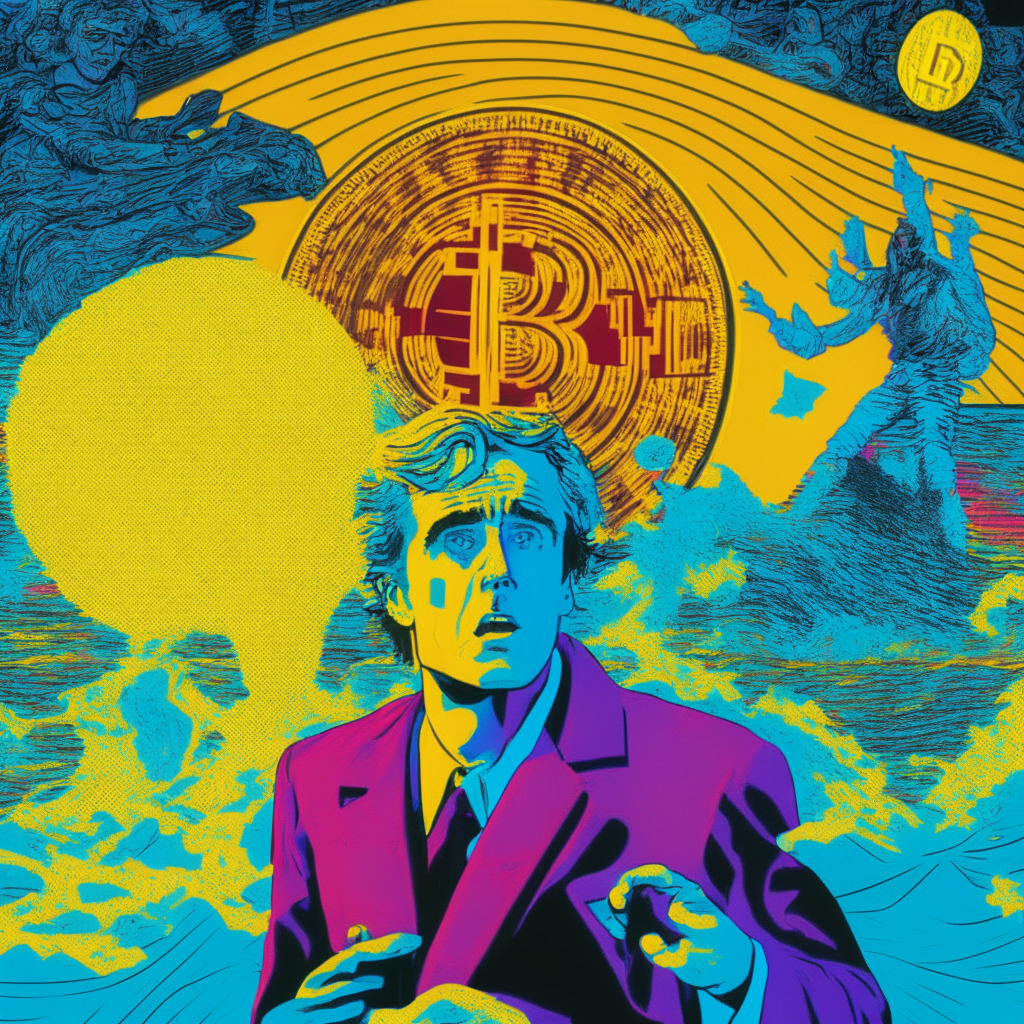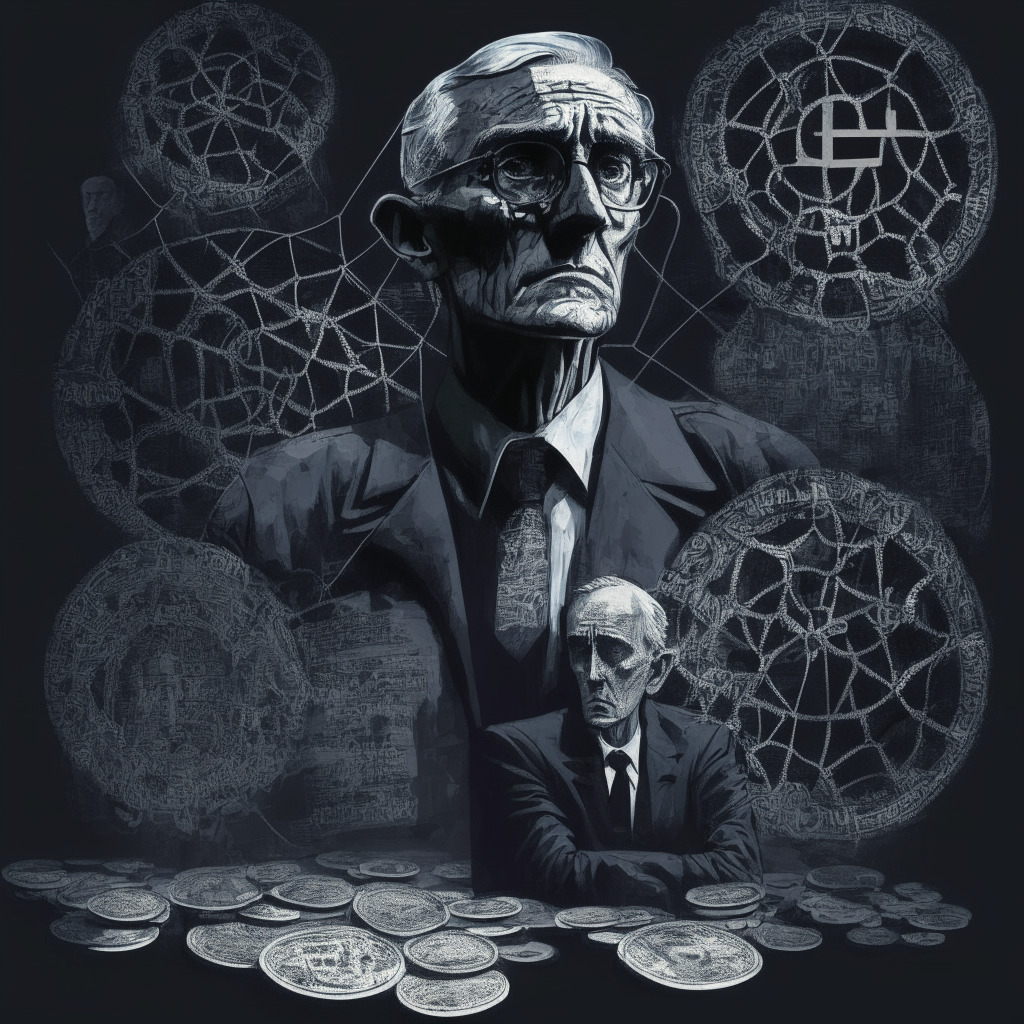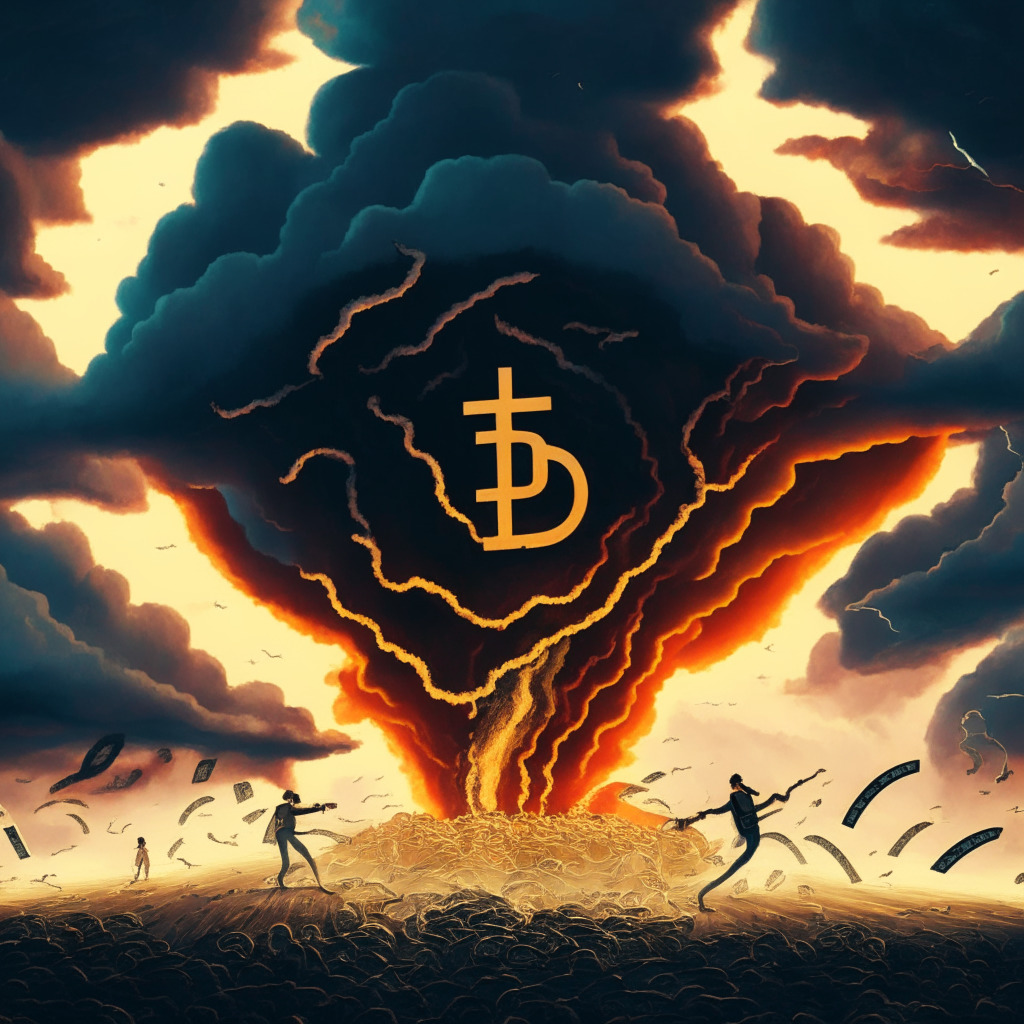Tornado Cash co-founder, Roman Storm, was arrested over money-laundering charges. The case has raised debates about responsibility and control within the blockchain industry, particularly for software developers. This controversy suggests that future blockchain regulation is navigating uncertain territory.
Search Results for: U.S
Cryptocurrency Disruption: Diving Deeper into Futures, Influences and Legal Ambiguities
The report by JPMorgan suggests the open interest in Bitcoin futures at the CME is nearing the end of its cycle, indicating an optimistic approach to the near-term impact on crypto markets with a limited downside. The SEC’s ongoing Ripple case, market dynamics, and tech assets adjustments are influencing market fluctuations. The future course for digital assets will be shaped by macroeconomics, regulatory developments, and industry-specific events.
Mastercard Ends Crypto Card Partnership with Binance: An Insight into Evolving Crypto Regulations
Mastercard has announced the termination of its cryptocurrency card partnership with Binance amid increased regulatory scrutiny of the cryptocurrency exchange. This decision, however, does not affect Mastercard’s other crypto card partnerships and highlights the evolving landscape of crypto regulations.
Navigating the Tokenization Wave: Growing Value and Unique Challenges in Blockchain-based Assets
Tokenization uses blockchain to monetize tangible and intangible assets, making them tradable and transparent. Despite cryptos’ ridicule for lack of tangible value, blockchain’s potential to transform assets is increasing. There’s even exploration of derivative, swap, and fixed income security systems. Companies like Pendle Finance and Dinari are demonstrating this potential, while concerns rise about tokenizing user engagement. Elsewhere, Central African Republic is aiming to tokenize its fiat money, a move that could inspire other countries.
Navigating the Crypto Market amid Economic Uncertainty: Top Picks for Traders
“Expectations grow as Federal Reserve Chairman, Jerome Powell’s comments historically impact financial markets including cryptocurrencies. Amid this anticipation, recommended choices are Render, Sonik Coin, Immutable X, yPredict, and Internet Computer, notable for their robust fundamentals and encouraging technical analysis.”
Cryptocurrency Coders in Legal Crosshairs: Who is Accountable for Blockchain Misuse?
“Roman Storm and Roman Semenov, coders of the Tornado Cash protocol, face U.S. legal proceedings, accused of aiding North Korea’s Lazarus Group with money laundering. This indictment raises questions on developer accountability, regulation standards, and the balance between potential national security risks and the right to financial independence and privacy in blockchain technology.”
Coinbase Woos Canadian Banks: A Shot at Crypto Mainstream Adoption or Regulatory Risk?
U.S. crypto giant, Coinbase, negotiates with top-tier Canadian banks to bring crypto banking mainstream in Canada, amidst regulatory ambiguity back home. The company’s director, Lucas Matheson, praises Canada’s ‘engagement-focused regulation’ allowing companies like Coinbase to explore and grow whilst staying within regulatory norms.
Mastercard and Binance Separation: A Shift in Crypto-Regulation Landscape or a Business Misstep?
“The recent separation between Mastercard and cryptocurrency broker Binance raises questions regarding Binance’s regulatory issues. Despite ending the partnership, Mastercard remains interested in blockchain technology. But, caution has been advised for Binance users in response to these unfolding events.”
Crypto Correction and Market Downfalls: The Bittersweet Symphony of Financial Growth
The cryptocurrency market, including Bitcoin and Ether, is in a ‘significant downtrend,’ following last week’s sudden drop. This mirrors a downwards trend in traditional markets such as the Nasdaq Composite and S&P 500. Despite this, the economy continues absorbing policies from the past 16 months without visible harm to spending or job creation.
Navigating the Crypto Winter: A Professional Responsibility for Financial Advisors
Despite volatility and what’s known as a “crypto winter”, financial advisors need a clear awareness of cryptocurrency risks and benefits according to Noah Billick from Rennoco & Co. Advisors failing to comprehend crypto’s potential role in a client’s portfolio risk neglecting their fiduciary duties. Additionally, the crypto industry is steadily progressing, with improved custodial practices and regulatory developments leading the way.
Navigating the Regulatory Jungle: Unraveling US Cryptocurrency Rules and Impacts on Market Dynamics
CoinRoutes CEO Dave Weisberger discusses the complexity of cryptocurrency regulation in the United States, criticizing the use of outdated structures for new technologies. He argues for a requisite evolution of regulatory approach, without stifling innovation, warning of the potential loss of American competitiveness in the rapidly expanding crypto industry.
Dramatic Plunge in Ether Futures on Binance: Unsettling Calm or the Start of a Storm?
The U.S. dollar value in active ether perpetual futures contracts on Binance has dropped to $1.41 billion, the lowest in over a year. Binance has seen its ether futures notional value dip 35% within a week, reflecting a system-wide leverage washout. This suggests a lower probability of future volatility instigated by liquidations.
Bitcoin’s Rise Amid Market Rally: Balancing Crypto Rewards and Risks
“Bitcoin sees a substantial boost, correlating with traditional stock market rallies. Despite this, the bankruptcy of crypto exchange FTX serves as a reminder of market volatility and risk. Meanwhile, the DeFi sector shows bullish trends, offering traders legitimate and potentially highly profitable alternatives.”
Legal Shifts in Ripple v. SEC: A Game of Musical Chairs and Patricia’s PTK Launch: Building Suspense or Building Concern in Crypto World?
“The ongoing SEC v. Ripple lawsuit takes a fascinating turn with the withdrawal of three SEC attorneys and the addition of new ones, potentially impacting case progression. Meanwhile, Nigerian crypto exchange Patricia launches its native token, Patricia token (PTK), amidst security breach speculations and customer fund access issues, sparking worries of a potential exit scam. These developments underscore existing uncertainties in crypto regulation.”
Crypto Market Sees Green: A Sudden Upsurge or a Sign of Recovery?
“In the last 24 hours, major crypto tokens Solana and Cardano gained 3% while Bitcoin and Ether rose by 1.2%. This crypto resurgence aligns with advances in European stocks and U.S. equity futures. However, the crypto market’s inherent volatility continues, subjecting investors to skepticism and exhilarating climbs.”
Integration of Real-World Assets and DeFi: The Future or a Paradox?
“Pendle Finance aims to integrate real-world assets within the digital finance ecosystem, opening access to traditional financial instruments. While this could attract large, off-chain institutional investors, it raises questions of blurring boundaries between decentralized finance and traditional systems.”
The Dance of Regulation: How SEC’s Stance on Staking Shapes Crypto Innovation and Security
Bitstamp calls an end to staking services in the U.S., driven by the country’s stringent regulatory landscape. Conversely, the ether Liquid Staking Derivatives market shows potential for growth, expecting to grow to $24 billion in two years, highlighting the contrasting effect of regulatory environments on cryptocurrency ventures.
Institutional Titans Stirring Up Waves in Crypto: B2C2 and Woorton Merge to Navigate EU Market
The acquisition of French firm Woorton by London-based B2C2 boosts institutional presence in the global crypto marketplace. Woorton’s over-the-counter services and clients integrate into B2C2’s framework, potentially increasing market liquidity. Collaborations like this, underlying regulatory compliancy, and the growing trend of institutional adoption offer promise in navigating crypto markets’ volatility.
Nvidia’s AI Dominance: Potential Boom or Over-Dependence Risk Amidst Crypto Scams?
“The sharp rise in Nvidia’s share prices can be attributed to increasing demand for AI chips. The company separates itself from competitors like Intel and Micron Technologies by focusing on research and development in AI technology. However, as this sector continues to grow, scams target consumers of this technology, underscoring the need for stronger regulations and safety protocols.”
Crypto in Politics: RFK Jr’s Support for Bitcoin & Deep Dive into Current Market Trends
U.S. presidential candidate Robert F. Kennedy Jr. has voiced support for Bitcoin, promising to remove capital gains taxes on cryptocurrencies if elected. His stance adds an interesting perspective, while the fluctuating crypto market continues to affect prices. Notably, Toncoin, Sonik Coin, Binance Coin, Launchpad XYZ, and Tron exhibit promising dynamics amid market volatility.
From State Pensions to Crypto Scam: The Blazar Token Controversy and Its Lessons for Investors
“John A. DeSalvo, a former lieutenant at the New Jersey Department of Corrections, is facing a crypto scam charge by the SEC. He allegedly obtained $623,388 from investors through Blazar token sales, falsely claiming that the token was registered with the SEC. The token lost 99.9% of its value shortly after its debut, leading to significant investor losses.”
Nvidia’s Success Stirs AI-Crypto Market: A Sustainable Surge or a Risky Ride?
“In the global transition from general-purpose computing to AI, several AI-related cryptocurrencies have significantly uplifted, driven by tech giant Nvidia’s exceeded Q2 earnings predictions. Worldwide companies are racing to adopt generative AI, indirectly boosting AI-related cryptos. However, despite potential, the volatile crypto market necessitates investor caution and understanding.”
Navigating Uncertainty: Evaluating Contributing Factors to Crypto Market’s Recent Slump
“Recent market dynamics show a significant decrease in the total crypto market valuation over a span of 10 days. Contributory factors include rising interest rates, increasing finance costs, a decrease in consumer spending, and a liquidation of investments. Nevertheless, expert analysis suggests possible economic resilience and a diminished likelihood of a long-lasting recession. At the same time, regulatory pressure and heavy offshore trading stirs controversy in the crypto industry.”
Decoding Ethereum Layer-2 Networks: Coinbase’s Pivot, Shibarium’s Revamp, and Solana’s Resurgence
The blockchain realm witnesses escalating discussions about secondary “layer-2” networks built atop Ethereum using “zero-knowledge” cryptography. Meanwhile, Coinbase pioneers blockchain education by operating its own blockchain, Shibarium aims to resolve network issues, and Solana recovers after significant setbacks while Terra falls victim to hackers.
The Legal Gambit of Crypto Mogul Sam Bankman-Fried: Blaming the Lawyers or Smart Defense Strategy?
Crypto figure Sam Bankman-Fried is facing legal charges including fraud, with a claim of acting in ‘good faith’ based on advice from his lawyers at Fenwick & West. This ‘advice of counsel’ approach could potentially disprove intent of fraud, but comes with risks like waiving lawyer-client confidentiality and unpredictability of having lawyers as witnesses. Adherence to the purported legal advice is key for this strategy’s success.
Navigating the Regulatory Waters: An In-Depth Look at Crypto Regulations and Their Impact
Former FTX CEO, Sam Bankman-Fried, has been given unique access to his legal team amid a controversial criminal case. The move reflects potentially changing attitudes towards the crypto sector. Despite increasing regulation scrutiny, some argue this could shape a more secure and robust crypto ecosystem.
Longest Negative Year for Bitcoin: A Dark Tunnel with Light at its End?
Despite Bitcoin’s recent longest negative year-over-year returns, Dan Morehead, founder of crypto investment firm Pantera Capital, remains optimistic. He believes the half-cut of the BTC block reward for mining in April 2024 will propel bitcoin’s price. His models suggest that bitcoin will reach around $35,500 by the halving and nearly $150,000 by late 2025. Amid market fluctuations, Bitcoin’s future trajectory continues to raise questions.
Tornado Cash Founders Charged: A Blow for Privacy or Triumph for Law Enforcement?
“Roman Storm and Roman Semenov, key figures of Tornado Cash, are facing charges for helping North Korea’s Lazarus Group launder over $1 billion via a privacy mixer. This incident sparks debate on blockchain privacy protections being exploited by criminals versus the potential shortfalls of legal jurisdiction in regulating such abuses.”
Decentralized Finance: A Revolutionary Potential Sailing Rough Waters
“The capital held in decentralized finance (DeFi) protocols has dipped to $37.5 billion, its lowest since February 2021. This drop comes amidst concerns about governmental regulations, falling crypto prices, and recent scandals. Despite Ethereum’s rise, DeFi’s total value locked (TVL) has contracted, suggesting inherent challenges exist in the DeFi market.”
Shift in Crypto Market Sentiment: XRP, Ripple Labs & the Impact of Legal Fallout
The current market shows traders favoring profit-oriented price movements over traditional buy-and-hold strategies. A shift that’s evident in XRP’s loss of gains, potentially linked to Ripple Labs’ controversial court ruling over the SEC. This shift introduces increased risk and uncertainty, requiring cautious and refined investor strategies.
Navigating Legal Maze: Panini’s NFL NFTs Amidst NFLPA’s Shift to Fanatics
“The NFL Players Association has cut ties with collectibles company Panini to join forces with Fanatics, leaving uncertainty over the future of Panini’s NFL-themed NFTs. Despite legal entanglements, Panini-minted NFTs may be safe due to the first-sale doctrine, which permits the original owner to keep rights to their work after ownership changes.”
Insider Trading in the NFT World: Wildlife of the Crypto Jungle
Ex-OpenSea product head, Nate Chastain, receives a three-month prison sentence for insider trading, marking a significant moment in NFT regulation. Chastain amassed $50,000 through unethical practices, leading to his conviction for fraud and money laundering. This fall of a major figure prompts worry and caution in the crypto world. His sentencing serves as a stark reminder of commitment to fairness, while potentially discouraging upcoming talent due to fear of prosecution.































